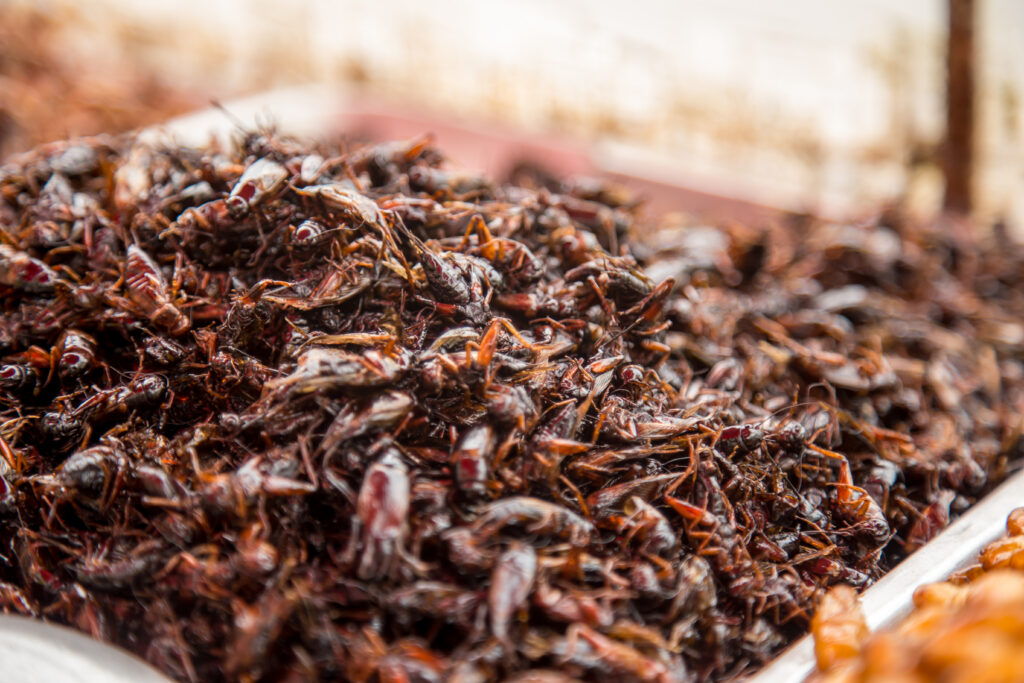For millennia, insects have played a role in human diets. Communities across Asia, South America, Africa, and the Pacific Islands incorporating a diverse range of insects such as beetles, caterpillars, bees, ants, grasshoppers, crickets, dragonflies, and even termites into their culinary traditions. In Asia, there is a long tradition of insect consumption in several countries. Insect farming is carried out in Cambodia, Laos, Malaysia, South Korea, Thailand and Vietnam.
In recent years, farming insects for human as well as animal consumption has been on the rise. The Food and Agricultural Organisation (FAO) has advocated insects as a potential food source that can help to address food security issues. The European Union and countries like Australia, New Zealand, Korea and Thailand have approved several insect species for human consumption. Singapore Food Agency has also announced that sixteen species of insects including crickets, silkworms, grasshoppers will be approved for human consumption in the second half of 2023.
Fried grasshoppers sold on the streets of Thailand
Image by pvproductions on Freepik
Insects as a sustainable food source
Edible insects are a source of high-quality protein, vitamins and amino acids for humans. With their high feed-conversion efficiency, they can convert feed into protein at a higher rate than livestock. Insect farming also has higher land-use efficiency than traditional protein sources. It requires 2 to 10 times less agricultural land to produce 1kg of edible insect protein compared to 1kg of protein from pigs or cattle.
For example, crickets need only 2 kg of feed to gain 1 kg of weight, and they use fewer resources and produce fewer greenhouse gases than animals like pigs and cattle. Even though insects are small, they are packed with nutrients, including protein, fat, fiber, vitamins, and minerals. Mealworms, for instance, have as much unsaturated omega-3 acid as fish, and even more than pork and beef. Insect farming has been around for centuries, with bees and silkworms being among the first insects to be farmed.
In addition, insects feed on food waste, agricultural residues, and agri-business processing byproducts to convert into insect-based products. They play an active role in the waste valourisation to produce food, feed and high-value commodities such as frass and biofuel.
Rise of insect farming
Insect farming is becoming increasingly popular in Southeast Asia, especially Laos, Vietnam, and Thailand, where cricket farms are meeting the growing demand for insects for human consumption. Insects are valued for their ability to efficiently convert food into protein. Scientists and entrepreneurs see the immediate potential in using insects as animal feed, with black soldier flies being a common insect species farmed to break down food waste and convert it into livestock feed.
Their high fecundity, high feed conversion efficiency and rapid growth rates make them attractive and viable candidates for farming. In addition, they can be reared in small modular spaces, making it feasible to raise them in both urban and rural areas. Farmed insects are a versatile and sustainable resource that can be used for a variety of purposes, including:
- Animal feed: With rising costs of fishmeal, insects are seen as an ideal alternative for high-protein feed given its similar nutrient profile and environmentally efficient way of production
- Human consumption: Insects can be consumed whole or processed into products like protein bars, chips and cookies
- Organic fertilisers: Frass, which consists of insect faeces and undigested food, contain beneficial bacteria that act as plant growth microorganisms, improving plants’ health and facilitating the absorption of nutrients.
- Other uses: Biofuel, chitin and chitosan extracted from black soldier flies can be used in cosmetics and pharmaceuticals.
Challenges of the insect sector
As an emerging food source, there are challenges involved in the scaling of the insect protein sector. The major challenges outlined in a FAO report are:
- Acceptance of insects as food and feed: The main challenge is overcoming neophobia and disgust towards insect consumption. Based on research, FAO suggests that strengthening communications related to the benefits of eating insects, incorporating insects into familiar food items such as pasta, protein bars, tortilla chips) instead of marketing whole insects.
- Regulatory hurdles: With the exception of a few regions, there is an absence of international regulatory frameworks to support production, risk assessments, quality control measures and commercialisation of insects.
- Research gaps regarding food safety: Further research is needed to establish shelf-stability and safety of insect-base products used both in human food and animal feed.
- Production concerns: Currently, the scale of global insect production is not large enough to compete with conventional food and feed sources. To be considered a sustainable nutrient source would require a massive increase in production values.
In conclusion, insects have the potential to be a sustainable and nutritious food source for the future. However, more research and investment is needed to overcome the challenges that currently exist.
Sustainable Food Future at FHA – Food & Beverage 2024 showcases innovative products and technologies that contribute to a secure and sustainable food system. These include novel food, alternative proteins, sustainable agriculture and circular economy solutions. This exciting area features a tasting bar, thought-leadership seminar, startup spotlight and accelerator lounge for exhibitors and start-ups to connect with customers and investors. Contact us to get involved.












